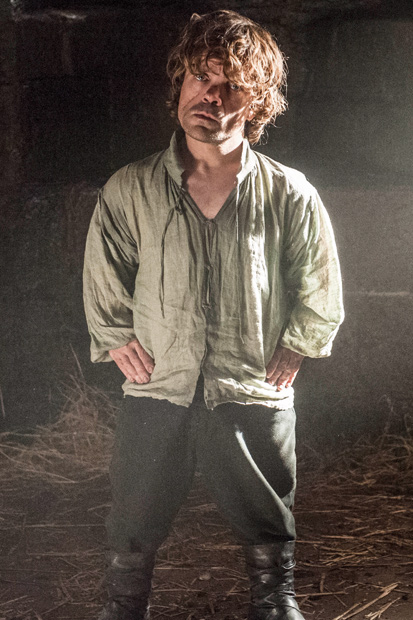Which character are you in Game of Thrones? For me it’s got to be the imp, Tyrion Lannister. As Ed West suggested in his erudite Speccie article a few weeks ago, Tyrion is about the only character with a vaguely sympathetic 21st-century mindset as opposed to a ruthlessly pragmatic medieval one. Persecuted since childhood because he’s a dwarf, he understands — as his fellow members of the ruling class generally do not — what it is to be marginalised, downtrodden and thus empathetic.
And the other reason to identify with him is that he’s not going to die. I say this without any knowledge of what happens in George R.R. Martin’s books. It just strikes me that Thrones without the Imp would be like Hamlet without the Dane. Tyrion is our touchstone of humanity in a world otherwise characterised by savage cruelty, incest, torture, severed heads, heaving breasts, lust, betrayal and — praise the Lord! — more heaving breasts.

This week on Thrones found our hero facing his greatest challenge yet: how on earth was he going to escape being executed — on trumped-up charges, of course, for life in Thrones is relentlessly unfair — for the murder of his revolting nephew King Joffrey?
At first — plot spoilers ahoy! — it seemed as if he would get off with a pardon in return for ‘taking the black’ — i.e., accepting warrior-monk exile in the Wall. But then the rug was ripped from under our feet. Shae, the beautiful whore who so loved Tyrion (and whom he so loved in return), unexpectedly reappeared to testify against him. And instead of pleading for clemency, as had been the plan, Tyrion decided to go out with a bang — cursing his family, damning everyone in the courtroom, throwing his life into the lap of the gods by demanding that his fate be settled by trial by combat.
Game of Thrones is now probably the world’s most popular TV series. It’s hard to be sure because so much of its audience views it via illegal download. But we do know that just recently it broke the record previously set by the final episode of The Sopranos for the most viewed telecast ever to appear on the subscription-only channel that financed it, HBO.
Now that even President Obama is a fan (he gets his episodes sent in advance to the White House), HBO’s decision to back it looks like a no-brainer. But that’s not how it seemed at the time of series one. Here was what the New York Times had to say: ‘If you are not averse to the Dungeons & Dragons aesthetic, the series might be worth the effort. If you are nearly anyone else, you will hunger for HBO to get back to the business of languages for which we already have a dictionary.’
So just how did GoT manage to reach out to an audience far beyond its natural market of spotty, malodorous male teenagers? Superb casting and acting, for one. Charismatic, charming, tender, sexy Peter Dinklage — as Tyrion — has transformed for ever the way we look at dwarves on screen. He’s not a mildly freakish, comically sympathetic bit player: he is, quite simply, the star.
Ruthless plotting, for another. As George R.R Martin demonstrated in his Red Wedding massacre, no one in Thrones is ever truly safe. Today’s happy couple enjoying a cloyingly sweet romance could easily be tomorrow’s dog meat on the banqueting hall floor. It’s painful and discomfiting but it’s the essence of all the best storytelling: the more misery you inflict on your characters, the greater your audience’s desperation to find out how they get out of it…
If they ever do get out of it. There’s one poor fellow called Theon Greyjoy who has been in agonies for weeks, thanks to an extended episode of sadomasochistic torture porn in which, having been brought to the brink of ecstasy by some gorgeous nubile, he was then dragged from between her legs to have his willy cut off. No, really. And now he is being treated by his tormentor — a vicious brute called Ramsay Snow, the Bastard of Bolton — as a subhuman slave creature, kept in a cage like a dog and renamed ‘Reek’. Not much of a bright future for him, I suspect.
I’ve lots of theories as to why GoT has proved so successful: the relief it affords viewers that, however miserable their week has been, at least they haven’t been tortured or dismembered, or crowned with a bucket of molten gold; the intrigue; the breasts (or did I mention those already?)…
But I think the bottom line is that if your film or TV series is to become one of the truly greats then the key is to throw conventional wisdom out of the window and pursue your deranged idea with the intensity and conviction of Fitzcarraldo up the Amazon or General Giap at Dien Bien Phu. It can’t be done, they’ll say. And maybe they’re right. But oh, the satisfaction in proving them wrong.







Comments